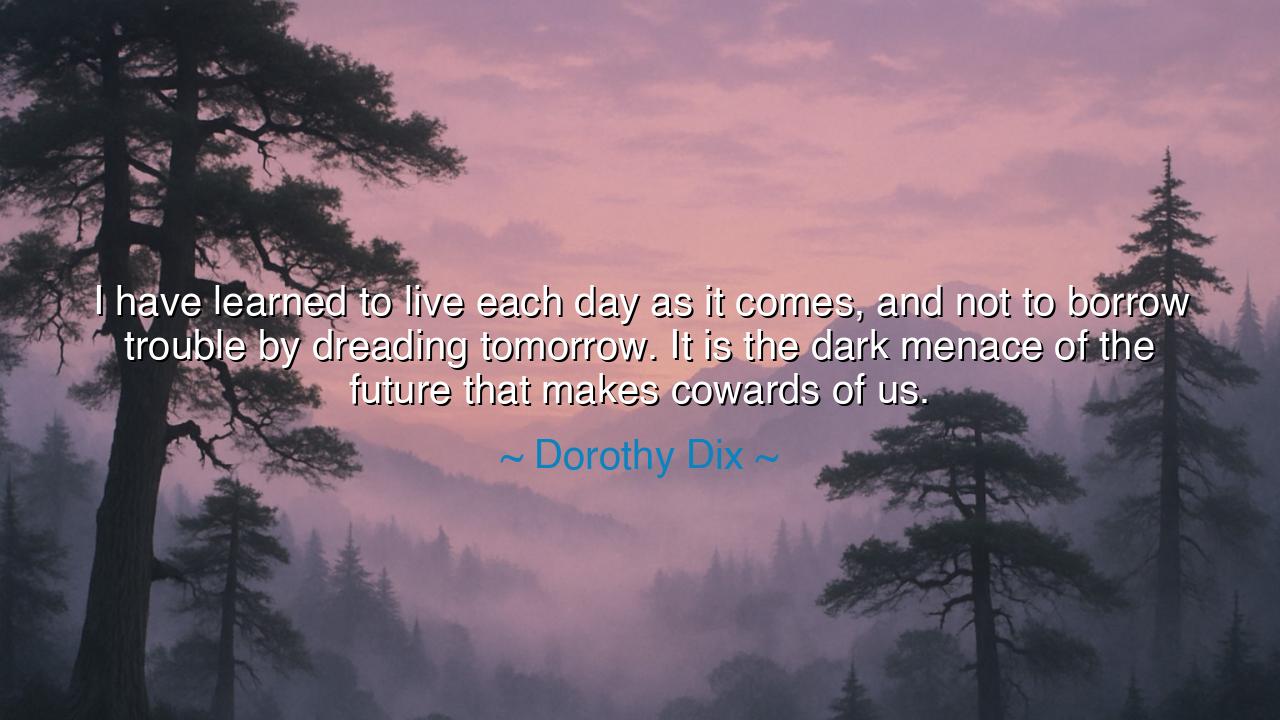
I have learned to live each day as it comes, and not to borrow
I have learned to live each day as it comes, and not to borrow trouble by dreading tomorrow. It is the dark menace of the future that makes cowards of us.






In the words of Dorothy Dix, “I have learned to live each day as it comes, and not to borrow trouble by dreading tomorrow. It is the dark menace of the future that makes cowards of us.” Thus speaks the wisdom of a soul who has wrestled with fear and found peace not in the promise of control, but in the acceptance of life’s unfolding. This saying, simple yet profound, rises like an eternal song from the heart of human struggle — a call to courage against the phantom terrors of the mind.
In ages past, the sages knew well this truth. The Stoics of old — Marcus Aurelius, Epictetus, and their kin — taught that man is tortured not by the events of life, but by his fear of what might come. The future, unseen and formless, becomes a beast of shadow when the imagination lends it teeth. Thus, Dorothy Dix, speaking in the voice of these ancient thinkers, warns that it is not tomorrow itself that destroys peace, but our trembling before its specter. To “borrow trouble” is to let the unborn day consume the living one, to drink poison in fear of thirst.
Consider the story of Sir Ernest Shackleton, the explorer who led his men across the frozen hell of Antarctica. When their ship, Endurance, was crushed by ice, death loomed in every direction — cold, hunger, isolation. Yet Shackleton taught his crew this very lesson: live only this day. Each dawn, he forbade despair and fixed his gaze upon the single task before them — survival till nightfall. They lived not for the distant rescue that might never come, but for the warmth of the moment’s fire, the companionship of men still breathing. And because they did not surrender to the “dark menace of the future,” they endured. Every man lived.
This teaching pierces deeper than comfort — it demands valor of the spirit. For to live each day as it comes is not indifference; it is mastery. It is to walk amid uncertainty with the calm of one who trusts the river’s flow. The coward trembles before tomorrow’s storms; the wise man learns to build his shelter today. In this way, the heart grows strong not through the absence of fear, but through the courage to meet it only when it stands before us, not when it is still but a rumor in the wind.
We must remember that the future is a shadow cast by the mind. When we dwell too long upon it, our strength withers in anticipation of battles that may never come. The ancient teachers would say, “He who fears the future dies a thousand deaths.” Yet he who greets each sunrise as a gift dies but once, and even then, with peace upon his lips. Let the unknown remain unknown until its time. For every hour spent fearing the morrow is an hour stolen from joy, gratitude, and purpose.
And what of those who must still plan, who must labor toward goals beyond the horizon? The wise balance their foresight with presence. Prepare for tomorrow, but live in today. Lay the seed, yet do not despair for the harvest. Tend the field with hope, but love the act of tending more than the fruit it may bring. This is the essence of peace — not the denial of uncertainty, but a sacred partnership with it.
Let this then be the lesson for the children of time: Do not borrow trouble. The burden of tomorrow is not yet due; pay only the price of this day. Stand firm where your feet rest now. If sorrow must come, meet it when it arrives — not before. Let courage and calm be your shield, gratitude your companion, and faith your compass. For when the night grows heavy with unknowns, remember that it is not the darkness that makes cowards of us, but our fear of what it hides. The wise heart knows: each dawn is a promise renewed, and each day — a victory over fear itself.






AAdministratorAdministrator
Welcome, honored guests. Please leave a comment, we will respond soon